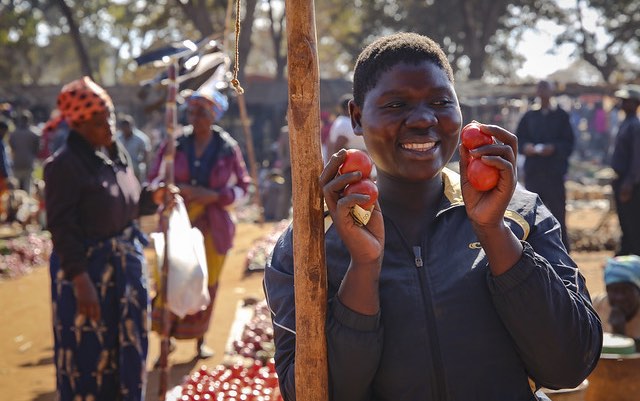Gender norms and inequalities are an important factor in Malawi’s ongoing food security problems. They shape agricultural practices and production, knowledge acquisition, innovation, food choices—and ultimately household food security and nutrition. Women have generally lower levels of education and lack decision-making power over fertility, farming, and resource allocation, all contributing to food insecurity. Gender norms may also restrict women’s ability to attend agriculture trainings and put that knowledge into practice.
Typically, agriculture and nutrition education programs focus on addressing the lack of women’s access to trainings. But our recent paper, published in Global Food Security, paints a more nuanced picture of this challenge in Malawi. The findings suggest that agricultural and nutrition information programs be more carefully targeted to different problems specific to different gendered household types and to promote collaboration between men and women.
Our research departs from previous studies in a number of ways. Among them, we expand on the simple “female-headed households” vs. “male-headed households” comparison, applying a gendered typology differentiating those with both male and female adults (“dual-adult households”); households with sole female adults (“women-adult-only households”); and households with sole male adults (“men-adult-only households”).
We used a mixed-methods research approach, analyzing both quantitative sources (nationally-representative household survey data) and qualitative (focus group discussions) to illuminate aspects of gender and intrahousehold dynamics relating to access to information and its effect on food security.
IFPRI conducted a series of household and community surveys of 3,001 households in 299 randomly selected communities. We also conducted 22 gender-disaggregated focus group discussions with a total of 113 male and 141 female participants, sampled from 11 communities in eight districts from the same geographic areas as the surveys.
One surprising result: Contrary to widespread belief, women-adult-only households are not always the poorest and most food insecure. We found a more complex story: Men-adult-only households were worse off as measured by their household dietary diversity score (HDDS)— a count of food groups household members have consumed over a daily or weekly reference period. Women-adult-only households were worse off by another metric, the household food insecurity access score (HFIAS), assessing the experience of food insecurity.
We found other noteworthy differences between men-only and women-only-adult households. For the former, formal education and literacy levels and nutrition education were linked to improved food security. For the latter, landholdings, livestock units (especially poultry), having other assets, planting tree and root crops, and nutrition-related information seem to be the most important drivers of food security.
Overall, information and training are key to achieving household food security. But that depends on access and on the content offered. For dual-adult households, joint access to information for the man and the woman has a stronger effect on food security compared to access by one gender only—whether related to nutrition, markets, or agriculture.
However, we found that women in these households often get the sole responsibility of attending training and meetings, especially on nutrition. This has a clear downside. Rather than viewing this as an opportunity for empowerment, many women found it to be a burden placed on them by busy or uninterested husbands. Time poverty is a well-documented problem for women, who tend to be burdened with responsibilities in both the productive and reproductive realms.
The results also indicate that having a single household member attend trainings or information meetings is a poor way to transmit information. Women and men both reported barriers to sharing and applying information learned this way. Men often questioned the ability of their wives to comprehend extension messages and complained that women were cautious about new approaches they had not learned first-hand. Women reported fear of conflict and domestic violence when sharing new information with their partners.
Both men and women viewed joint attendance as important—to reinforce and apply the new information, and to promote a unified whole-family approach to household development. Particularly for nutrition education, joint participation can help make men active partners with women in ensuring good household nutritional outcomes.
The results suggest that targeting both women and men for nutrition education is potentially empowering, as it not only works on changing behavior, but also starts to challenge gender norms that represent women as responsible for food preparation and other domestic tasks and men as responsible for productive and business activities.
Most development and food security projects base their targeting on poverty and vulnerability. Our results suggest that there are other important considerations needed to address gender-based constraints. For women-adult-only households, gender-based discrimination in accessing markets, organizations, associations, labor, and opportunities should be addressed in project designs. Men-adult-only households should be included in targeting for nutrition education. And strategies that ensure both men and women have joint access to information can help to close the gender gaps in terms of agriculture and nutrition knowledge, participation in community committees and processes, and plot management.
Catherine Ragasa is a Senior Research Fellow with IFPRI’s Development Strategy and Governance Division; Noora-Lisa Aberman is an Associate Research Fellow with IFPRI’s Ghana Strategy Support Program.
Support for this research was provided by the Government of Flanders; the Gesellschaft für Internationale Zusammenarbeit (GIZ), the development agency of the German government; Strengthening Agricultural and Nutrition Extension (SANE) project, funded by the U.S. Agency for International Development (USAID) mission in Malawi as an activity of Feed the Future; and by the CGIAR Research Program on Policies, Institutions, and Markets (PIM) led by IFPRI.







